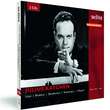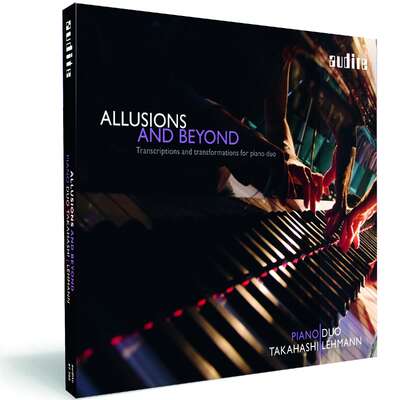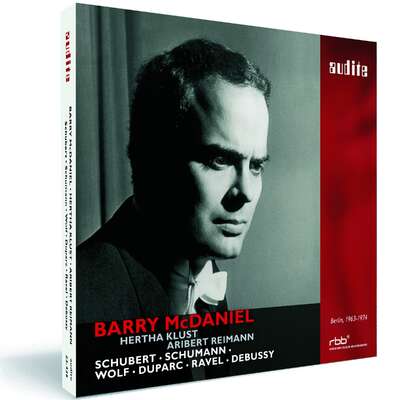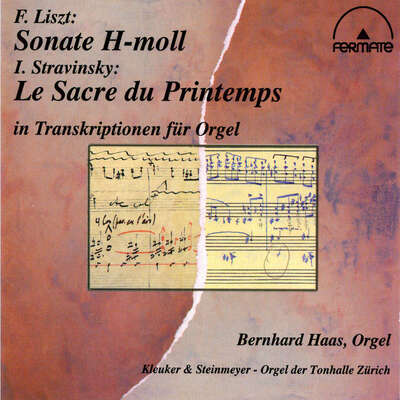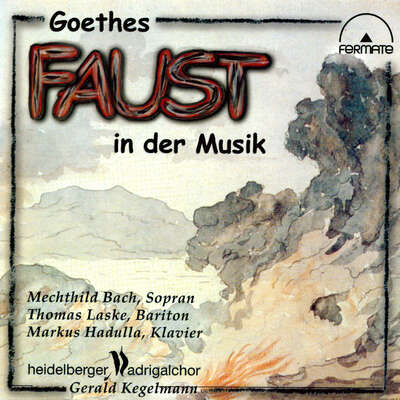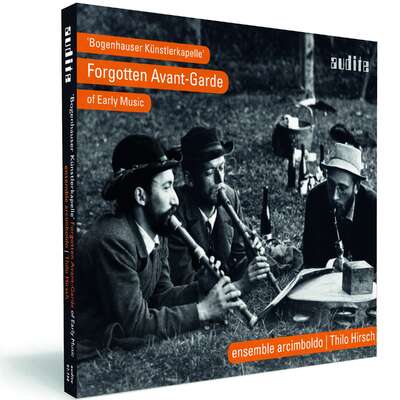
Die vorliegenden Solo-Aufnahmen Julius Katchens für den RIAS Berlin von Werken Beethovens, Brahms‘, Chopins, Schumanns und Liszts h-Moll-Sonate erweitern seine Diskographie um gleich sechs Erstveröffentlichungen. Durch die natürliche Verbindung von Virtuosität, Musikalität und Formsinn werden die Aufnahmen zu Dokumenten zeitlos großen Klavierspiels.mehr
"Few pianists have given such free rein to their feelings and imagination, and his Liszt Sonata, even in today's crowded marketplace, is among the most glittering and awe-inspiring on record." (Gramophone)
Titelliste
Details
| Julius Katchen plays Liszt, Brahms, Beethoven, Schumann and Chopin | |
| Artikelnummer: | 21.419 |
|---|---|
| EAN-Code: | 4022143214195 |
| Preisgruppe: | BCA |
| Veröffentlichungsdatum: | 14. März 2014 |
| Spielzeit: | 108 min. |
Zusatzmaterial
-
Producer's Comment
unmittelbare Eindrücke des Produzenten Ludger Böckenhoff
- Jullius Katchen Pressemappe
- Pressemappe JULIUS KATCHEN
Informationen
Die vorliegende Zusammenstellung sämtlicher Solo-Aufnahmen Julius Katchens, die in zwei Sitzungen 1962 und 1964 entstanden, erweitert die Katchen-Diskographie um gleich sechs Erstveröffentlichungen: Beethovens Rondo Die Wut über den verlorenen Groschen op. 129, Chopins As-Dur-Ballade, die beiden berühmten Nocturnes op. 9,1 und op. 27,2, die späte Berceuse und schließlich Liszts Klaviersonate h-Moll, eines der Hauptwerke der Klaviermusik des 19. Jahrhunderts. Katchens virtuos-energetische Auseinandersetzung mit der Liszt-Sonate nimmt unter den großen Einspielungen dieses Stückes einen besonderen Platz ein. Aber auch seine Deutungen der Werke Chopins, Beethovens und des späten Brahms sind durch ihre Verbindung von Natürlichkeit, Musikalität und Formsinn Dokumente zeitlos großen Klavierspiels. Der tragisch früh an Leukämie verstorbene Julius Katchen (1926-1969) repräsentierte zusammen mit Leon Fleisher, Gary Graffman und William Kapell jene Generation der sogenannten OYAPs (Outstanding Young American Pianists), die ab 1940 zu einer starken und dauerhaften Konkurrenz der bis dahin auch auf den amerikanischen Podien dominierenden europäischen Pianisten heranwuchs. Der im Staat New Jersey in eine russisch-jüdische Einwandererfamilie hineingeborene Katchen debütierte bereits im Alter von zehn Jahren mit Mozarts d-Moll-Konzert; ein Jahr später wurde er von Eugene Ormandy für ein Konzert mit dem Philadelphia Orchestra als der bis heute jüngste Solist in der Geschichte dieses großen Orchesters eingeladen, und im Jahr darauf gab er sein Solo-Debüt in New York. 1946 zog Katchen nach Paris und wurde in den folgenden Jahrzehnten zu einem der aktivsten amerikanischen Musik-Botschafter in Europa überhaupt; seine weitgespannte Diskographie, in deren Zentrum die Einspielung des gesamten Klavierwerks von Brahms steht, weist ihn als souveränen Virtuosen neuen Typs aus, für den pianistische Brillanz kein Selbstzweck war, sondern einer tiefen intellektuellen und emotionalen Durchdringung und Identifikation diente. Zu dieser Produktion gibt es wieder einen „Producer's Comment" vom Produzenten Ludger Böckenhoff unter www.audite.de/de/product/2CD/21419/multimedia.
Besprechungen
www.artalinna.com | 21 janvier 2015 | Jean-Charles Hoffelé | 21. Januar 2015 Pas que Brahms mais tout de meme
Et montre dans l’Intermezzo adagio à quelle délicatesse il pouvait parvenir, s’irisant de couleurs toutes en sfumato. Dans la profusion de l’écriture harmonique, le piano de Katchen s’incarne soudain, unifié, intense, sobre et fulgurant à la fois. Et lorsque le cantabile parait (premier Intermezzo), il parle – vrai liedersänger qui donne de la chair aux notes comme avec des mots.<br /> <br /> Les radios européennes conservent quantités de témoignages engrangés par Julius Katchen, il faut espérer que ce double album n’est que le prélude à bien des découvertes.Mehr lesen
Les radios européennes conservent quantités de témoignages engrangés par Julius Katchen, il faut espérer que ce double album n’est que le prélude à bien des découvertes.
Correspondenz Robert Schumann Gesellschaft | Nr. 37 / Januar 2015 | Irmgard Knechtges-Obrecht | 1. Januar 2015 Neue Schumanniana in Auswahl – CDs, DVDs, Notenausgaben und Literatur ausgewählt von Irmgard Knechtges-Obrecht
Im Mittelpunkt steht Liszts berühmte Klaviersonate in h-moll, mit der Katchen CD 1 eröffnet. Voller Energie und hoch virtuos interpretiert er dieses Ausnahmewerk, zeigt sich dann in den folgenden Sieben Fantasien op. 116 sowie zweien der Sechs Klavierstücke op. 118 von Johannes Brahms auch dessen ausdrucksvoller Musiksprache bestens gewachsen [...]Mehr lesen
Scherzo | Enero 2015 | Emili Blasco | 1. Januar 2015 Una joya de alto voltaje
Al igual que su Sonata de Liszt, abrumadora, poderosísima, apabullante podría decirse, que destila perfección estética, con un sonido siempre depurado hasta la última pincelada. El pianista, transmisor de lo indecible, construye alrededor de la partituras un halo de permanencia, diríase infinitud o perennidad al que difícilmente los de hoy día pueden acercarse. Una joya claramente ineludible.Mehr lesen
Diapason | N° 628 - Octobre 2014 | Jérôme Bastianelli | 1. Oktober 2014
Ces enregistrements inédits réalisés en 1962 et 1964 pour la Radio de Berlin-Ouest apportent six précieux compléments à la discographie deMehr lesen
Les quatre pièces de Chopin sont également des nouveautés. Tout en respectant une ligne directrice rigoureuse et ferme, le pianiste s'y abandonne à des envolées lyriques d'une grande beauté. La perpétuelle tension entre perfection apollinienne et liberté dionysiaque fait tout le charme de la Ballade op. 47, tandis que des clairs-obscurs emplis de distinction habitent la Berceuse ou le Nocturne op. 27 n° 2 (ainsi que L'Oiseau prophète de Schumann). Le Rondo a capriccio de Beethoven constitue le dernier inédit: un tempo trépidant permet à l'interprète de s'amuser un peu avec les moyens techniques dont il dispose. Les Variations en do mineur sont plus subtiles, même si les pages agitées sonnent avec quelques duretés. Dans le Scherzo op. 4 de Brahms, l'élan et la puissance rythmique du jeu transforment la partition en quelque préfiguration de l'oeuvre de Prokofiev: l'impression d'un «passage en force» est assez désagréable. On sait pourtant que Katchen nourrissait une véritable passion pour le compositeur hanséatique, qui lui inspire dans deux Klavierstücke un mélange d'abandon et de vitalité, de passion et de maîtrise digne de sa célèbre intégrale.
American Record Guide | September 2014 | Sang Woo Kang | 1. September 2014
Acclaimed for his legendary interpretations of Brahms, Katchen does not disappoint us with this program. Remastered from 1960s radio sessions, itMehr lesen
True to form, the Brahms is excellent, especially the fiercely rhythmic Scherzo. He captures every nuance in one of the most convincing interpretations of Ballade 3 I have heard in a long time. His rubatos are sensitive and tasteful; he performs the coda with a fine balance of passion and control. Berceuse is exquisite. While clearer passagework and more polished playing may be heard from countless recordings of the Liszt Sonata, they cannot compete with his magnificent and original rendering. Katchen’s command of the architecture and dramatic range of the work nullifies any misfired notes. He delivers the 32 Variations with razor-sharp clarity.
The sound quality is excellent. Audite has assembled a fine tribute to an astounding pianist whose career ended too soon.
Piano News | 4/2014 (Juli/August) | Carsten Dürer | 1. Juli 2014 Berechtigte Würdigungen
Ohne jegliche Verklärung vermag er [Julius Katchen] die wechselhaften Charaktere so brillant herauszuarbeiten, versteht das Sentiment des Tanzrhythmus innerhalb der Dramatik ohne Übertreibung aufzubauen, dass man bestürzt zuhört.Mehr lesen
www.musicweb-international.com | July 2014 | Brian Wilson | 1. Juli 2014
There are six first-ever releases of works new to Katchen’s recorded repertoire in this Audite twofer. It documents recitals for RIAS Berlin inMehr lesen
The rest of the first disc is given over to a composer whose music Katchen played with such insight, Brahms. The Seven Fantasies, Op.116 are played with real insight into their very particular sound world, sympathetically drawing out their expressive nuance and sense of melancholy and withdrawal. For all his virtuoso standing Katchen was a profoundly lyric performer and this set underscores the point. So do the two pieces from the Op.118 set, the Intermezzo and Romanze. Given that these are largely unedited performances one would expect a few finger slips, but they are – as in the Liszt sonata – of negligible significance. I freely admit I played these two pieces from the Op.118 set repeatedly and held up my reviewing responsibilities, so affecting were Katchen’s performances of them.
There is more Brahms on disc two, a stormy performance of the Scherzo in E flat minor, boldly argued and living dangerously. Both Beethoven performances are new to his discography. The Rondo, Op.129 (Rage over a Lost Penny) scintillates and the Variations in C minor finds Katchen in discerning form, marrying structural imperatives with digital drive. His Chopin is fluent and charismatic and there is the great advantage of pieces once more appearing for the first time in his discography, namely the two Nocturnes - Op.9 No.2 and Op.27 No.2. They receive properly rich readings, and there is no need to cite, say, Lortat, Cortot or Moiseiwitsch here, as Katchen stands at a remove from that lineage.
The 1962-64 tapes sound splendid and with a fine booklet note this production is an exceptionally fine addition to Audite’s already admirable sequence of RIAS releases.
Gramophone | July 2014 | Bryce Morrison | 1. Juli 2014
Audite's two-CD set of recordings made for RIAS Berlin in 1962 and 1964 adds several first issues to Julius Katchen's discography (including the LisztMehr lesen
True, his lavish style, his fulsomeness and coloration will hardly appeal to a puritan taste. He had little time for musical discretion or propriety. Few pianists have given such free rein to their feelings and imagination, and his Liszt Sonata, even in today's crowded marketplace, is among the most glittering and awe-inspiring on record. Hear him in the flourish at 7'03", a flash of lightning down the keyboard, but hear him also in the slow descending scales at the close of the central Andante or in the valedictory coda, and you will be made aware of a pianist who could change with chameleon rapidity from an all-guns-firing brio to a sense of the sonata's still, elusive centre.
He takes Brahms (always a speciality) by storm, too, and if there are moments (in the E flat minor Scherzo) where his volatility overwhelms the music's content, making for listening more exhausting than exhilarating, Katchen's glowing cantabile, backed by a charismatic theatricality, makes his Chopin a glamorous alternative to a more patrician approach, his rubato heady and alluring. There is delicacy and poetry in Schumann's 'Prophet Bird', making these finely recorded discs a thrilling confirmation of Katchen's stature, of a pianist whose tragic death at the age of 42 robbed the world of a unique personality.
Gramofon | 2014. június 28., szombat | Zay Balázs | 28. Juni 2014 Berlin hatvan körül
A stuttgarti Audite cég több mint negyven éve működik aMehr lesen
Musica | numero 257 - giugno 2014 | Riccardo Risaliti | 1. Juni 2014
Questa versione registrata da Katchen alla radio berlinese è una delle esecuzioni tecniche più smaglianti che si possano ascoltare;Mehr lesen
Audiophile Audition | May 6, 2014 | Gary Lemco | 6. Mai 2014
This Audite anthology provides six “first” releases to Katchen’s already impressive recorded legacy. [...] Katchen’s pearly play beguiles as much as his stentorian block chords and thrilling runs.Mehr lesen
BBC Music Magazine | May 2014 | Tim Parry | 1. Mai 2014
Katchen is well known for his imperious Brahms, but the true revelations in these 1960s German radio recordings are the Chopin and Liszt. A wonderfulMehr lesen
International Record Review | April 2014 | Nigel Simeone | 1. April 2014 Julius Katchen
Audite has released a set of recordings; made for RIAS Berlin by Julius Katchen in 1962 and 1964. The great discovery here is a major work KatchenMehr lesen
Classical Recordings Quarterly | Spring 2014 | Norbert Hornig | 1. März 2014
Last June Audite celebrated ist fortieth birthday. Based in Detmold, Germany, this label has built up a remarkable catalogue of carefully remasteredMehr lesen
String Quartet enthusiasts will be interested in Audite’s Volume 2 of RIAS’ recordings of the Amadeus Quartet. The new two-disc set is dedicated to Schubert, the Quartets No. 9 , 10 and 13-15, all recorded at the Siemensvilla in Berlin between 1950 and 1964. Schubert was always at the centre of the Amadeus’s repertoire, and its performances of this composer set a standard for others in those days (two discs; Φ 21.428). Piano enthusiasts will seck a two-disc set profiling the American pianist Julius Katchen. Katchen, who died in 1969 at the early age of 42, was especially known as an interpreter of Brahms and Liszt. These recordings were taped in two sessions in Berlin in 1962 and 1964. They are of special interest because some of the works played are new to the pianist’s discography – Beethoven’s 32 Variations in C minor, WoO80, Chopin’s Ballade, Op. 47, the Nocturenes Op. 9 No. 1 and Op. 27 No. 2 and Berceuse, Op. 57 as well as the Liszt Sonata in B minor, works in which Katchen demonstrates his qualities as a sensitive poet and virtuoso par excellence (two discs; Φ 21.419). […]
Hi Fi Review | 1/2014 | 1. Januar 2014
chinesische Rezension siehe PDF!Mehr lesen
klassik.com
| 12.05.2014 | Prof. Kurt Witterstätter | 10. November 2012 | Quelle: http://magazin.k...
Warmes Feuer
Julius Katchen spielt – Werke von Liszt, Brahms, Beethoven u. a.
Die plastische Klangreproduktion [...] bringt Katchens universelle Kunst auch heute noch in ihrem breiten Anschlagsspektrum, ihrem feurigen Schwung und ihrer mitreißenden Brillanz authentisch zur Geltung.Mehr lesen
